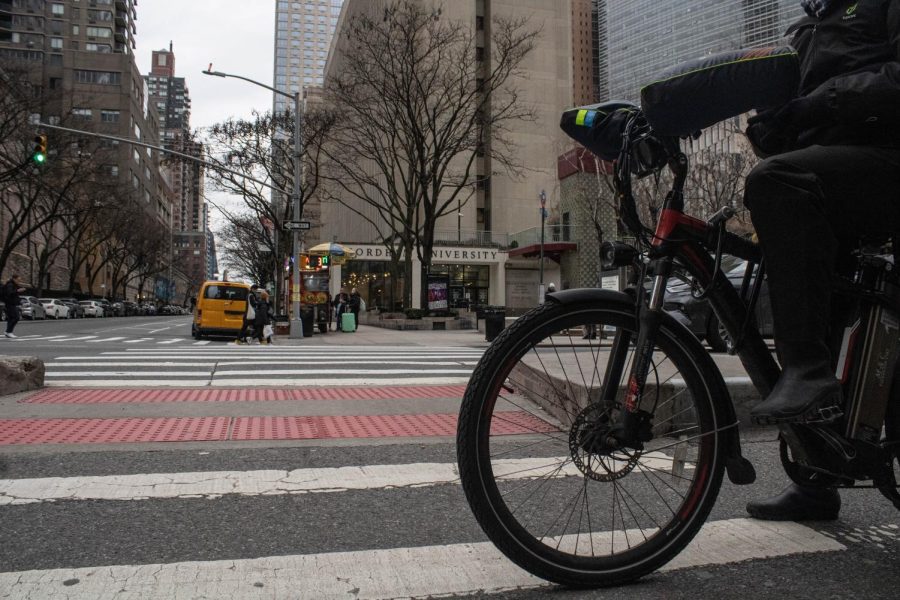Fordham Bans Battery-Powered Vehicles
A surge of fires and the FDNY’s fire safety regulations were critical factors in Public Safety’s decision to prohibit lithium-ion batteries on university properties
Fordham Public Safety issued a ban on battery-powered scooters, bikes and skateboards on all university properties following safety recommendations from the FDNY.
January 25, 2023
Following a spike in fatal fires across New York City due to faults in lithium-ion batteries, Public Safety issued an email on Dec. 8 informing university community members that all battery-powered electric scooters, electric bikes and electric skateboards would be banned on university property effective Jan. 3. The policy forbids individuals from using or storing their battery-powered vehicles on campus in an effort to avoid any hazards or fires that may erupt.
The email, which was sent by Associate Vice President for Public Safety Robert Fitzer, explained that the ban also stemmed from direction and safety recommendations from the Fire Department of New York. Fitzer noted that nearly 140 individuals have been hurt and six people have been killed due to fires caused by these batteries in 2022.
“The storage and charging of lithium-ion batteries in residence halls and other University buildings represent a serious hazard, as they may explode, causing injuries and starting fires,” Fitzer said.
Robert Dineen, assistant vice president for Public Safety, added that the decision was not due to any reported cases of fires caused by lithium-ion batteries on Fordham’s campuses but made out of an abundance of caution to protect both people and the university’s properties. He noted that the authorization of the policy was a “no brainer” because it would prevent community members from being harmed by any potential fires that may occur.
“The community members were aware of the fire risk from the tragedies reported in the media.They also mentioned that while walking on campus a scooter raced by them almost knocking them down.” Robert Dineen, assistant vice president for Public Safety
According to Dineen, Public Safety has received comments in support of the new policy, and the department has not heard any complaints against the ban.
“The community members were aware of the fire risk from the tragedies reported in the media,” he said. “They also mentioned that while walking on campus a scooter raced by them almost knocking them down.”
Andrew Kormilitsin, Gabelli School of Business at Rose Hill ’23, said that the new policy hinders students from transporting themselves around campus and defined the guidelines as “pretty vague” and an “extreme safety precaution.”
“It inhibits a lot of students from transporting themselves around campus,” he said. “It could be addressed in other matters.”
Kormilitsin noted that he has been using electric-powered devices for over six years and grew up in Manhattan, where he was part of a community that uses battery-powered vehicles. He added that he knows of over a hundred people within that community and is only aware of one person who had a battery malfunction that caused a fire.
According to Dineen, Public Safety will issue a warning to any individual who is observed to be using battery-powered vehicles on campus and direct them to a perimeter rack located near the university’s entrances to secure their device.
“I’ve only encountered one negative issue with batteries which was related to somebody actively tampering with the battery to increase his voltage,” he said. “As a result, when he was charging it, it exploded in his apartment which, even then, caused very minor damage to his wooden floor.”
Kormilitsin uses a Boosted board, a brand of electric skateboards, to travel to and from areas on campus that are far from his residence hall, such as Campbell, Salice and Conley Halls. He added that he utilizes his electric skateboard approximately three times a week but does not rely on it to travel to his classes.
Referring to the university’s decision to outlaw all types of battery-powered vehicles, Kormilitsin suggested only banning certain types of electric-powered devices but acknowledged that it may be difficult for the university to enforce that rule. He said that he believes it is easier for Fordham to blanket ban all devices without understanding that most of them are safe to use and have no issues whatsoever.
“I personally still have my devices and everything,” he said. “I still use them. It hasn’t fully stopped me from doing it. No one has told me anything.”
Kormilitsin shared that since the ban he has passed Rose Hill’s Matteo Ricci Circle located at the university’s entrance while using his Boosted board to travel around campus. The entrance has a security guard located inside the post who did not stop him. He added that notices about the ban were posted in his residence hall but believes that the university may not make an effort to go after individuals who are using battery-powered devices because they have already ensured the postage of signs stating their prohibition.
According to Dineen, Public Safety will issue a warning to any individual who is observed to be using battery-powered vehicles on campus and direct them to a perimeter rack located near the university’s entrances to secure their device. If an individual routinely violates the university’s policy, their conduct would be “forwarded to the dean of students or university department head for appropriate follow-up.”
Dineen added that the university is in support of the ban, and its goal to keep people safe.
“Our job is to keep the campus community safe and this decision goes a long way in helping us do just that,” he said.















